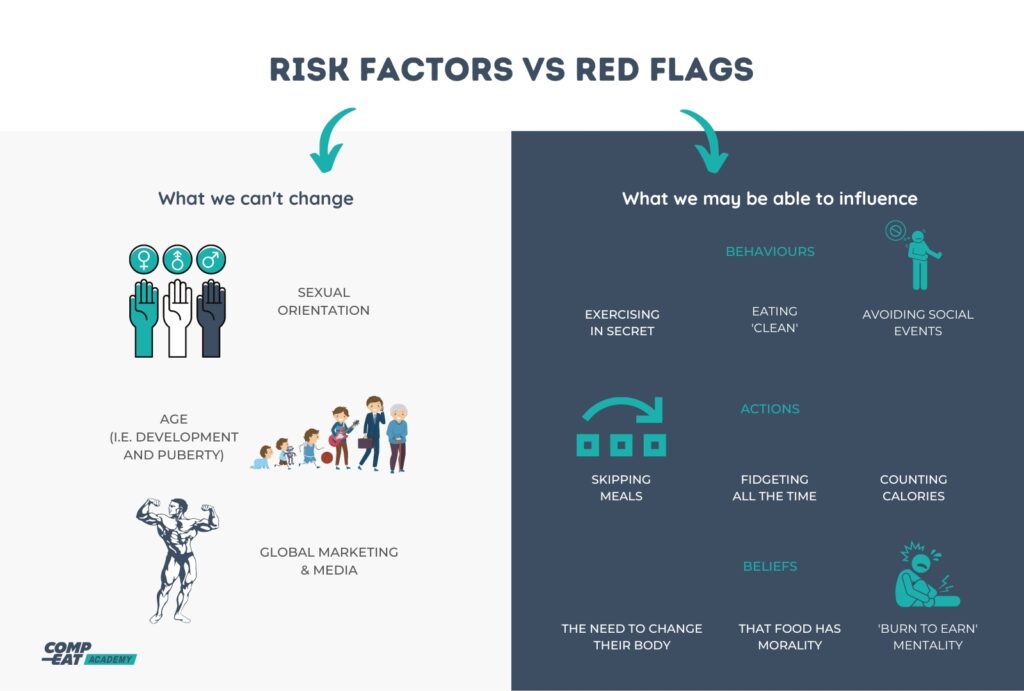7 red flags of poor body image in men
Are you a dietitian or nutritionist feeling unsure of how to identify poor body image in men? You’re not alone.
While conversations about mental health in men are becoming more common, poor body image is still a challenging issue to identify. This is especially true in male clients, as the stigma around eating disorders and body image concerns is often seen as “women’s issues”.
However, being aware of the signs of body image issues in men can help you better support your clients, fostering healthier self-esteem and a balanced relationship with their bodies.
Understanding the Impact of Body Image on Men’s Mental Health
Body image in men is deeply influenced by various factors such as societal expectations, age, and the pervasive portrayal of the “ideal male body” in the media. These ideals often emphasise leanness and muscularity, placing pressure on men and adolescent boys to conform to unattainable standards.
For dietitians, coaches or anyone working in the fitness or health space, distinguishing between healthy fitness goals and potential signs of underlying mental health concerns is crucial. While pursuing physical improvement is common, certain behavioural patterns may signal low self-esteem signs that require additional support.
Risk Factors vs. Red Flags of Poor Body Image in Men
Before diving into specific red flags, it’s helpful to understand the difference between risk factors and red flags:
Risk factors: Influences like age, cultural beliefs, environment or past trauma that may predispose someone to develop fitness and body image issues.
Red Flags: Observable behaviours or beliefs indicating that body image negatively affects mental health in men and their daily lives.
Now, let’s explore the seven red flags that could signal poor body image in men.

The Red Flags of Poor Body Image in Men
1. Pre-occupation with leanness and/or muscularity
Are your clients constantly talking about wanting to “lean down” or build muscle? This fixation can indicate that their sense of worth is tied to physical appearance rather than broader achievements or personal qualities.
2. Exercising despite injury or illness
Skipping rest days, “pushing through” injuries or adding extra exercise to their training schedule — despite being unwell — are concerning signs of body image issues. This behaviour often stems from a desire to maintain (or attain) a specific body type, potentially at the expense of their health.
3. Anxiety or panic when unable to exercise
Do your clients struggle to cope with missing a workout or not being able to exercise as planned? This extreme emotional reaction may be a sign of poor mental health in men caused by a negative body image.
4. Exercising in secret
If your clients are fidgeting or doing extra workouts in their room or without their coach’s knowledge, it could be a sign of body image issues. Watch out for that ‘burn to earn’ mentality where they feel the need to earn their food through exercise.
5. Excessive attention to diet
Constantly counting calories, tracking macros, fixated on what everyone else is eating, or cutting out food groups can signal disordered eating habits. Clients may label foods as “good” or “bad.” They may also experience guilt or shame after eating or engage in secretive eating.
6. Missing important activities that interfere with a workout schedule or a diet
If your clients are skipping important events or activities because it doesn’t fit with their workout schedule or ‘diet plan’, this behaviour could stem from poor body image in men. Other telling signs include skipping birthday celebrations or eating separately from the family or household, putting their relationships at risk.
7. Avoiding or fear of situations where their body may be exposed to others
Avoiding social events, especially those where their body may be exposed (such as pool parties) or wearing baggy clothing to hide their physique could indicate discomfort with their body. This fear of exposure often ties back to deeper insecurities about appearance.
How to Support Clients Showing Signs of Body Image Issues
If you notice any of these red flags in your male clients, initiating a deeper conversation is essential. Approach the topic sensitively and curiously, focusing on their relationship with food, exercise and self-image.
While these conversations may feel challenging, they can lead to pivotal moments of self-awareness and growth. For many people, this marks the start of a healthier and more balanced mindset.
Explore Compeat Academy’s Resources on Body Image and Mental Health in Men
At Compeat Academy, we understand that navigating conversations about mental health in men and addressing poor body image can feel overwhelming. That’s why we’ve developed courses to help you:
- Recognise red flags and risk factors for body image issues.
- Foster a safe and supportive environment
- Incorporate neurodiversity-affirming care to ensure inclusive and empathetic support.
- Delve into the complexities of body dysmorphia, disordered eating and eating disorders in men.
Expanding your knowledge and skills equips you better to support your clients and promote lasting change.
Explore our Compeat Academy course on Body Dysmorphia and Disordered Eating in Males, where we equip dietitians and nutritionists with the tools to address poor body image in men. Together, let’s break the stigma and foster healthier mental and physical well-being for all clients. Interested in our course? Request pricing today and take the first step toward empowering your clients!



